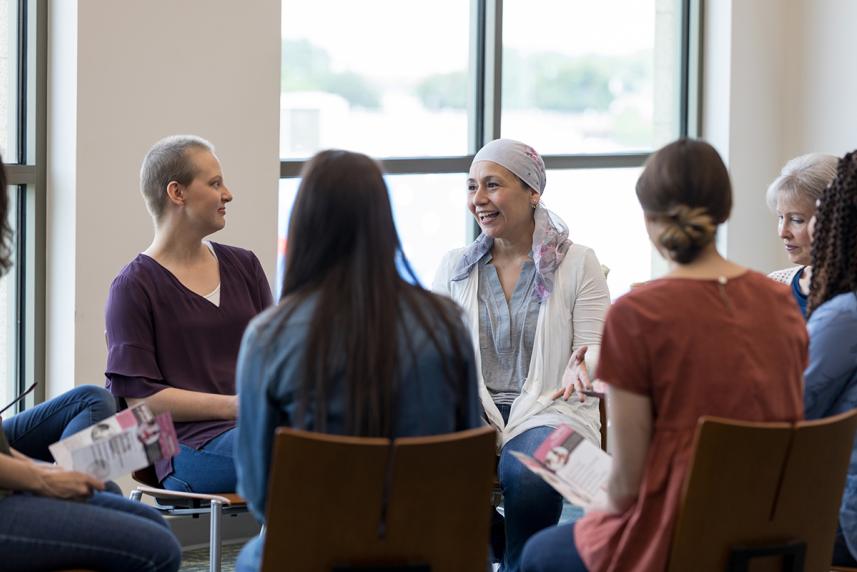
Find in-network specialists near you.
A colon cancer diagnosis can be overwhelming. Here are seven steps that can help you feel more in control.

You just got the news that you have colon cancer. If you feel worried, that’s only natural. A colon cancer diagnosis can come as a surprise.
But it’s important to remember that you’re not alone. Excluding skin cancers, colorectal cancer is the third most common cancer in men and women in the United States. The American Cancer Society (ACS) estimates that in 2023, around 107,00 people will get a colon cancer diagnosis. And treatments continue to improve.
“Colon cancer has a good outlook, especially if caught early,” says Elena Ivanina, D.O., a neurogastroenterologist.
Your doctors know how to treat colon cancer, and they’ll have a plan to help you. There are also steps you can take now to feel more in control – and prepare for the road ahead.
Your treatment will be overseen by a cancer care team. They will work together to come up with a treatment plan. Here are the doctors who might be on your team, according to the American Society of Clinical Oncology:
Expect other specialists on your team as well. You may have physician assistants, nurse practitioners, psychologists, nutritionists, social workers, and others. Their job is to help you get the best possible results.

Find in-network specialists near you.
Knowledge is power, and there’s a lot of good information about cancer online. But there’s also plenty of misinformation. Focus on these trusted websites when you do your research:
And know that colon cancer treatment today has improved and changed in recent years. “The treatment paths today are so different even from what they were 10 years ago,” says medical oncologist David Cosgrove, M.D. That’s important to remember.
One example is surgery, which is the most common colon cancer treatment. Today, it can often be done through minimally invasive surgery that uses tiny cuts. That makes for a quicker recovery, according to Johns Hopkins Medicine. The biggest change: New high-tech surgeries that result in less blood loss, lower infection rates, and shorter hospital stays.
You’ll need emotional support as you start your treatment. Now’s a good time to build up your support network. A study found that people with colorectal cancer did better when they had:
It can also be helpful to connect with people who have had colon cancer or are going through treatment right now. The Colorectal Cancer Alliance has support groups for patients and their families. “People need to hear that they’re not alone,” Dr. Ivanina says. “They will have help and support as they go through this.”
Knowing the basics about colon cancer can help you feel more in control. “One of the most important things in colon cancer is the stage of the cancer,” Dr. Cosgrove says. “That determines how much treatment might be needed.”
After you’ve been diagnosed, your doctors will check to see if your cancer has spread — and how far. Colon cancer stages range from 0 to 4. The higher the number, the more serious the cancer.
According to the ACS, the stages of colon cancer are:
You might be surprised (and relieved) by how fast your treatment can start after your diagnosis. “Surgery can be performed very quickly after a diagnosis is made. Chemotherapy and radiation may take a little more time to set up,” Dr. Ivanina says.
Sometimes, you may need more tests. Scans, for example, can point out exactly where in your colon that cancer is.
It’s safe to wait for a few days or even weeks for results, according to Dr. Cosgrove. “It feels like a long wait,” he says. “It feels like the cancer is continuing to grow and you’re not doing anything.” But for most patients, colon cancer grows slowly. “So things won’t change the next day or even the next week to put you at risk of some poorer outcome,” Dr. Cosgrove says.
Making small changes now can help you get ready for the road ahead.
Eat healthy. That means getting a variety of foods to give your body all the nutrients it needs. Cancer treatment can be challenging. But a healthy diet can help you stay strong, lower your risk of infection, and deal with treatment side effects, says the ACS.
For example, you might need high-protein, high-calorie foods to keep up your weight. Or you might need comforting foods like ice cream to soothe mouth sores from chemotherapy treatment. Your care team will help you figure out the best foods as you go through treatment.
One of the hardest side effects of cancer treatment is fatigue. But a new study shows that a Mediterranean-style diet — with plenty of fish and fresh fruits and vegetables, and only a little red meat — can help lessen fatigue. Talk to your team about the right eating plan.
Get regular exercise. A little movement goes a long way. Take a walk, go for a swim, or hop on the stationary bike for a few minutes. A 2021 review study suggested that exercise could make chemotherapy more effective.
“Many people feel not in control of their body after a cancer diagnosis,” Dr. Ivanina says. “But focusing on healthy nourishment and movement can help reconnect them with their body.”
Being diagnosed with cancer can be mentally exhausting. “It’s important to understand the emotions that go into hearing this diagnosis and into putting yourself through this treatment path,” says Dr. Cosgrove. “That’s not something any of us are really prepared for.”
One option: Work with a therapist who can give you tools to help you cope. Many therapists specialize in helping people who have cancer. Ask your care team or your oncology clinic, Dr. Cosgrove says. Or check with your insurance plan to find a therapist in your network.
You can also try mindfulness techniques or meditation. Dr. Ivanina also suggests stress-busting activities like yoga or meditation. And sometimes the best medicine is hanging out with friends and family.
Additional sources:
Colon cancer statistics: American Cancer Society
Cancer care team: American Society of Clinical Oncology
Social support study: Cancer
Surgery recovery: Johns Hopkins Medicine
Colorectal cancer stages: American Cancer Society
Study on exercise and cancer treatment effectiveness: Cancer Research
Blue Cross and Blue Shield of Kansas City is an independent licensee of the Blue Cross and Blue Shield Association.